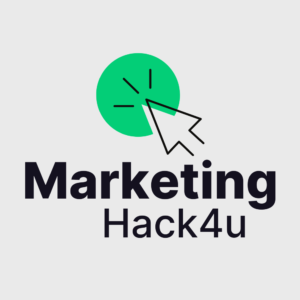One of the best and most tried-and-tested digital marketing techniques is email marketing, which is as relevant now as it was several years ago to generate interest, build up the sales funnel, and get potential clients to buy. Still, as your email list becomes larger, the process of constantly managing and, especially, sending personalized email messages will be challenging. This is where email automation tools come into play.
There are many opportunities to reach people through automated emails such as welcome emails, order confirmations, promotions, etc., that would improve business by delivering timely communications while reducing time and cost. Regardless of the size of your venture—enterprise, mid-size company, startup, or sole proprietor—the proper e-mail autopilot program can grow along with your business, increasing the campaigns’ efficiency and providing you with better worth for the money.
In this blog post, you’ll learn about 13 of the best email automation tools for businesses in 2025 and how to use them in detail. Let’s get started!
What is Email Automation?
Auto mailing means most of the time organizations prefer to send emails of different types automatically through computer programs without manually sending them one by one. These could be directed to only one recipient or an entire section of the audience depending on their activities, interests and dealings in your business.
Typical types of email automation include:
- Welcome Emails: Made when new users register with the list and become subscribers.
- Transactional Emails: Used to confirm purchases, registration or any other action that may have been made or taken on a site.
- Drip Campaigns: Lists of automated emails that are to be sent to leads at certain times to help them through the funnel.
- Abandoned Cart Emails: Applied to try to motivate customers to buy the products they had selected in the cart but for some reason left.
- Re-engagement Emails: Befitting those subscribers who may not be active when the opportunities are first published.
The advantage of automating communication is that firms can interact with customers with equal immediacy and customariness without the intervention of people.
Key Benefits of Email Automation for Businesses
Time Efficiency
Email automation helps reduce the need of manually sending emails which can be tiresome, especially to those many a time, their list continues to grow. Campaigns are also relatively easy to automate once established, which means marketers can concentrate on planning, these campaigns are creative and analyzing.
Personalization at Scale
When it comes to the kinds of communications that are being conducted through emails, businesses get the leeway of sending mass personalized communication to hundreds of thousands or even millions of recipients. By capturing customer information such as name, previous purchase records, or even browser history, an organization can set up personalized emails with high openness.
Improved Customer Engagement
Automated messages keep businesses at the forefront of the minds of their customers while at the same time reaching out to the audience with the right message at the right time. For instance, an abandoned cart email campaign conducted an hour after a customer exits your site has better conversion rates compared to a general email to customers that is sent days later.
Better Segmentation
Several email automation programs enable businesses to categorize their subscribers into specific groups depending on their buying trends, age, gender, or activity levels. By segmenting your audience this narrowly, there’s a higher likelihood of converting the audience you’re communicating to since the message is most likely to be personalized appropriately for the specific category the audience belongs to.
Cost-Effectiveness
Engaging in automatic emailing can help minimize the need to hire extra people which will in turn lower your costs of marketing. Moreover, recipients know that they are receiving a fairly automated email, which is why such emails tend to produce better results in terms of the ROI of the marketing money spent.
13 Best Email Automation Tools for Businesses in 2024
1. Mailchimp
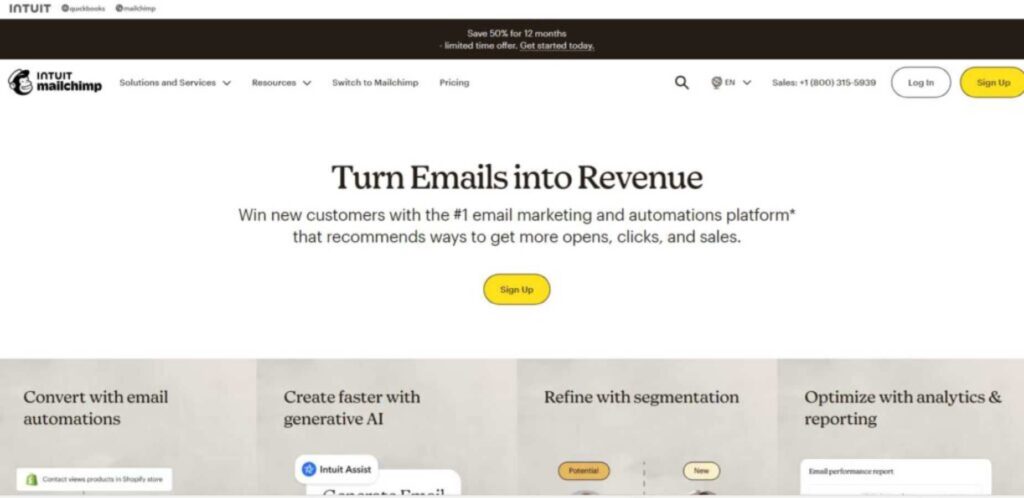
Mailchimp is one of the best-known and most-used systems for emailing automation and is ideal for SMBs. In the context of automated marketing communications, businesses can use Mailchimp to send out emails based on such audience activation instances as sign-up, cart abandonment, or purchase follow-up.
Originally, Mailchimp was an email marketing company however it has grown and evolved to be a solution that offers features such as landing pages, ads, and CRM. It is particularly ideal for the commercial end-user inclined to seek an all-in-one yet easy-to-use solution.
Features:
- Pre-built automation workflows
- A/B testing for optimization
- Advanced segmentation and targeting
- Comprehensive reporting and analytics
Website: www.mailchimp.com
Rating: 4.5/5
Best For: Small businesses, startups, and marketers who need an easy-to-use email marketing platform with basic automation features.
2. ActiveCampaign
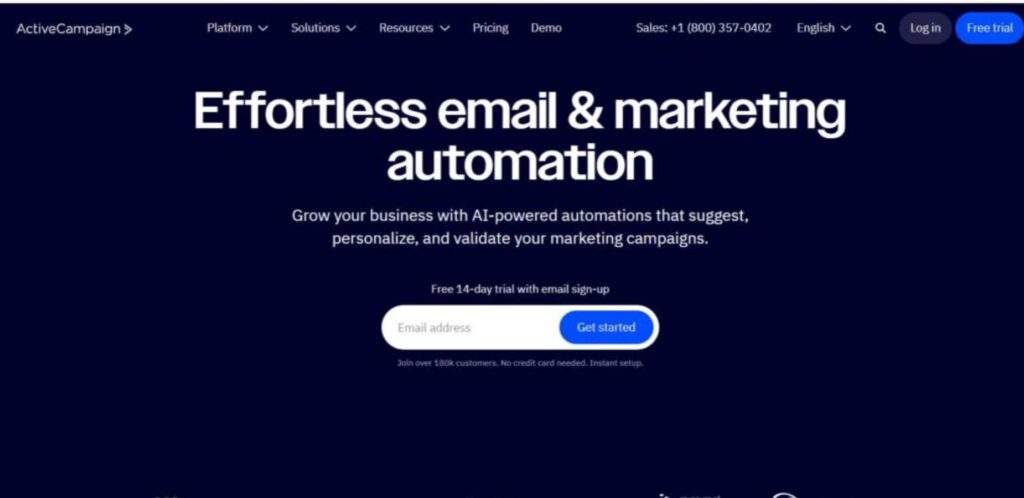
ActiveCampaign is an effective customer experience automation tool that combines email marketing with its customer relationship management functions. It is particularly suitable for use in automated campaigns because of its many automation workflows; it is excellent for firms that require diverse client interactions. With Action Campaign, businesses can design complex, multiple-step programs based on customer activity across the Web, within emails, or in making purchases.
In addition to email marketing, ActiveCampaign has now extended towards supporting other types of marketing which include SMS marketing, social media messaging and even live chats thereby making the tool ideal for use by businesses with complex marketing strategies.
Features:
- Multi-step workflows with complex triggers
- CRM features to track and manage customer relationships
- Email and SMS marketing
- Reporting and advanced analytics
- Integrations with major platforms like Shopify, WordPress, and Zapier
Website: www.activecampaign.com
Rating: 4.6/5
Best For: Mid-sized businesses and enterprises looking for advanced email automation with integrated CRM features.
3. HubSpot
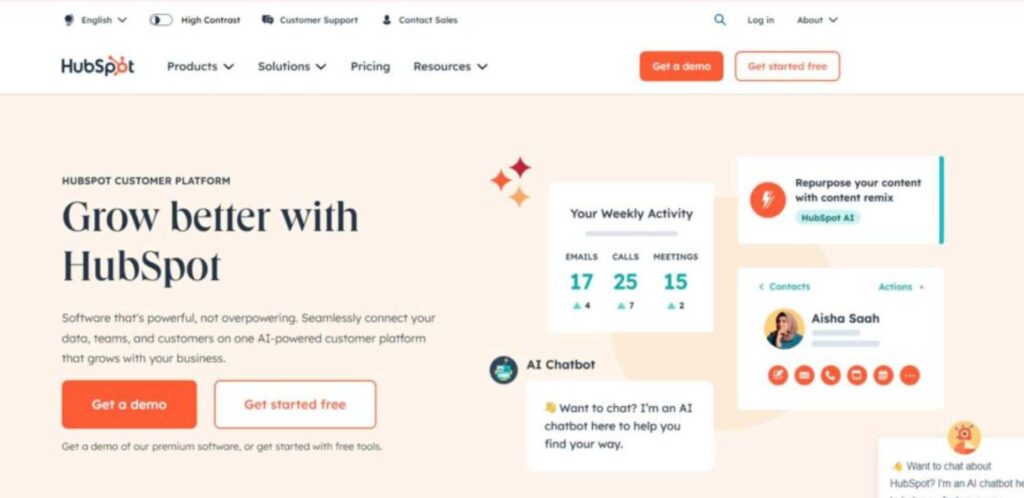
HubSpot is an inbound marketing platform and its email marketing tool is also exceptional. Featuring robust automation features, HubSpot enables marketing departments to automate marketing cycles, list segmentation and content customization for returns. One thing I found it has that other email clients do not is that you can track the leads, customers, and sales all from the same CRM.
HubSpot has more automation options than other services, For instance; the tool has introduced workflows that would respond to customer behaviour; therefore, it is a great tool for building lasting and loyal customer relationships as well as for enhancing the company’s sales.
Features:
- Advanced workflow automation
- Seamless CRM integration
- Personalization based on customer behaviors and data
- Reporting and A/B testing
- Extensive content management tools
Website: www.hubspot.com
Rating: 4.5/5
Best For: Large enterprises and businesses looking for a comprehensive CRM and inbound marketing solution with advanced email automation.
4. GetResponse
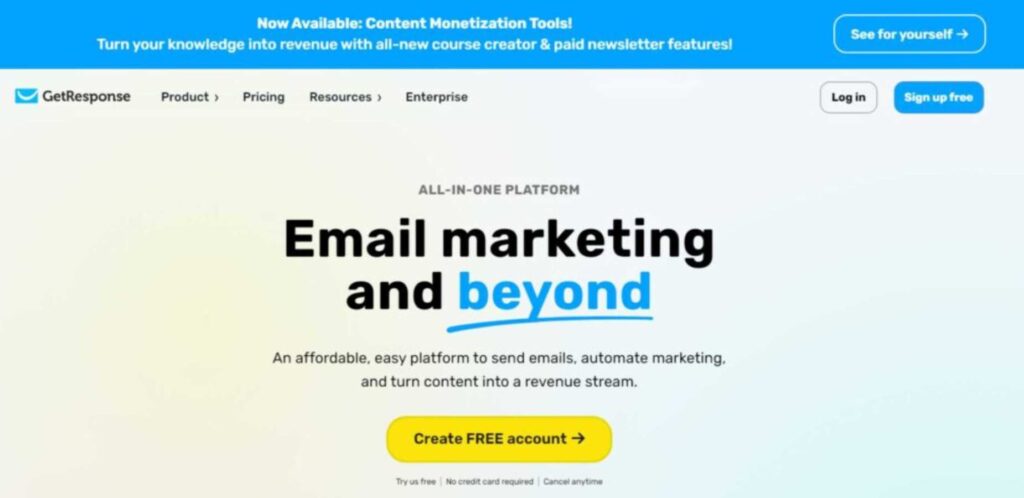
GetResponse is a feature-rich all-in-one marketing tool that extends beyond simple email marketing by including landing pages, webinars, and eCommerce/CRM. This enables businesses to set up drip email marketing campaigns based on people’s corresponding behaviours. In multi-step workflows, GetResponse is capable of sending out an email based on several actions ranging from purchases, to email opens or visits to particular web pages.
GetResponse also has a feature on the landing page and it even comes with webinar functionalities, which means it is ideal for any business that is planning to take on more elaborate marketing campaigns that include webinars as well as more lead generation processes.
Features:
- Multi-step email workflows
- Webinar hosting and email automation
- Landing pages and forms to capture leads
- A/B testing and analytics
- eCommerce integrations with platforms like WooCommerce
Website: www.getresponse.com
Rating: 4.2/5
Best For Marketers and eCommerce businesses looking for an all-in-one solution with email automation, landing pages, and webinars.
5. ConvertKit
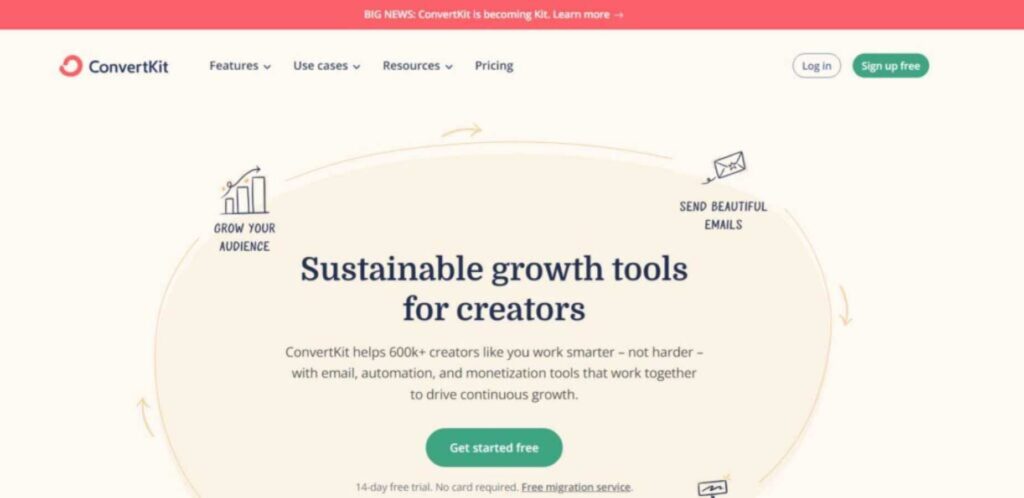
ConvertKit is created especially for authors, bloggers, and other content producers. The tool is easy to use and its interface is user-friendly; it enables users to create automation for subscribing new customers, selling non-tangible goods and many more. Using their visual automation creators, you can quickly create flows that automatically tag subscribers and send them targeted content.
As a marketing platform with a particular emphasis on email marketing, ConvertKit helps you get more out of your list by encouraging better connections with subscribers.
Features:
- Simple and visual workflow builder
- Advanced tagging and segmentation
- Email templates and landing page creator
- E-commerce integrations and digital product sales
Website: www.convertkit.com
Rating: 4.6/5
Best For Bloggers, content creators, and small businesses that need a simple and effective email automation tool with powerful segmentation.
6. Sendinblue
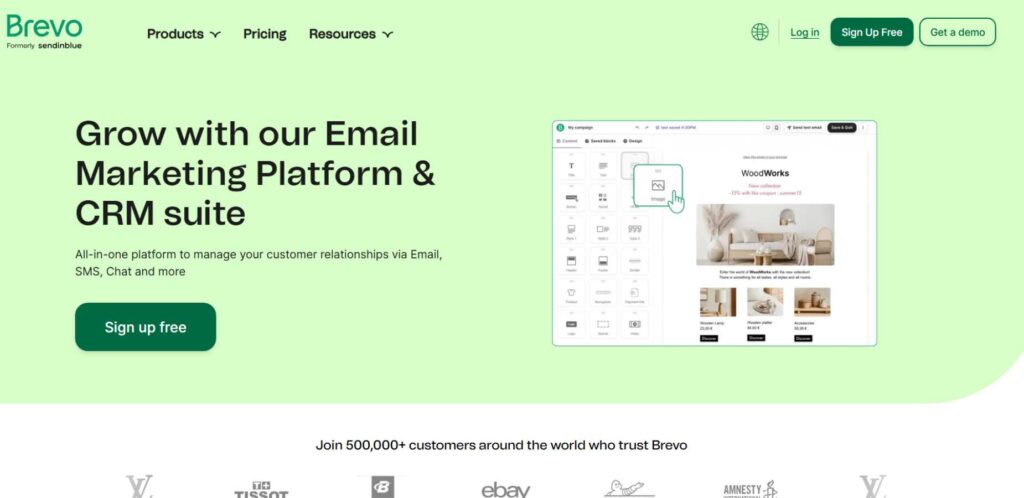
Sendinblue is a cheap email marketing tool that also includes SMS and live chat functionality. As an email automation tool, its special feature is that it also allows for multi-channel marketing. No matter if you introduce yourself with a need to send transactional messages or SMS alerts, or even if you prefer to address the customers with the live chat option, Sendinblue offers you the best opportunity to perform all these operations in your workflow.
The segmentation options available at Sendinblue are not only comprehensive but also flexible, so you can filter the customers according to their activity, location, etc.
Features:
- Email, SMS, and live chat automation
- Advanced segmentation and targeting
- Transactional email features
- A/B testing and analytics
Website: www.sendinblue.com
Rating: 4.5/5
Best For: Small businesses and marketers looking for a budget-friendly, multi-channel email automation platform.
7. Klaviyo
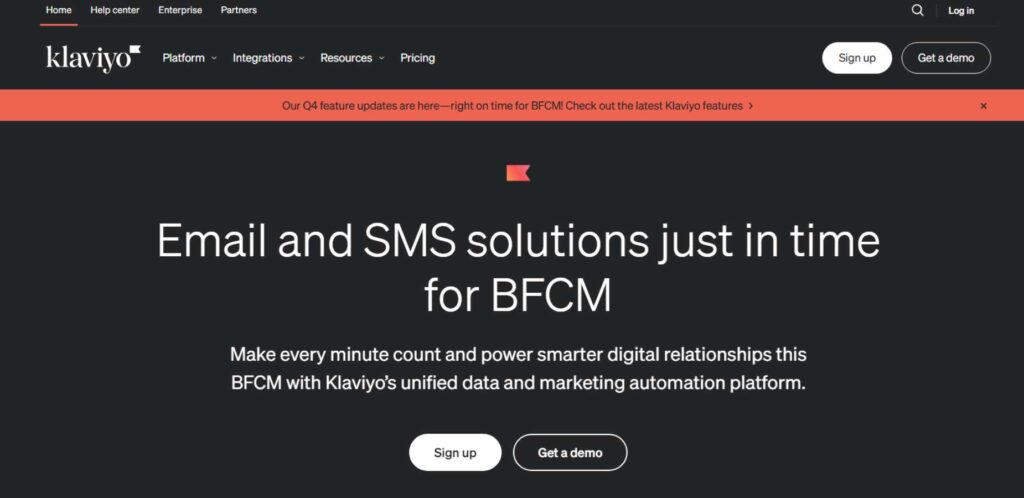
eCommerce businesses need the services of the best email automation tool, and that is Klaviyo. It also connects with Shopify, Magento, BigCommerce, and other tools and it helps businesses personalize email marketing based on customers’ activity. Klaviyo can assist customers in generating more revenue by having product recommendations and dynamic content options that alert clients about related products from your store.
Klaviyo is great at segmentation capabilities and personalization and is widely considered one of the best email marketing systems for making sales and increasing customer retention in the sphere of eCommerce. However, due to its cost and complexity, many businesses also explore alternatives to klaviyo to find a platform that better fits their budget and technical needs.
Features:
- Integration with major eCommerce platforms
- Advanced segmentation and personalization
- Product recommendation automation
- In-depth analytics and reporting
- Multi-channel marketing (email and SMS)
Website: www.klaviyo.com
Rating: 4.6/5
Best For: eCommerce businesses looking for advanced email automation and personalized product recommendations.
8. Drip
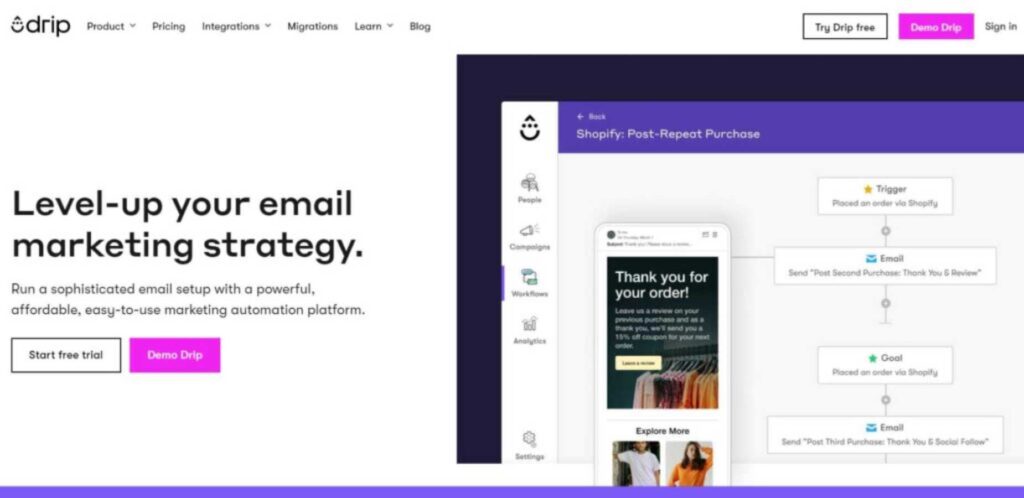
Drip is another strong email automation tool that targets mainly eCommerce and SAAS companies and stores. This assists businesses in automating the process that an individual has to follow when they are using the internet from browsing to buying. With its integration with customer relations management, Drip provides a means to manage leads, segment the customer base and send relevant messages through email, sms and more.
Drip’s visual campaign builder enables marketers to build complex customer journeys at every step of their sales funnel.
Features:
- Multi-channel automation (email, SMS, social)
- Behavioural triggers and advanced segmentation
- Visual workflow builder
- A/B testing and detailed reporting
- CRM integration for deeper customer insights
Website: www.drip.com
Rating: 4.5/5
Best For eCommerce and SaaS businesses looking for advanced CRM and email automation features.
9. AWeber
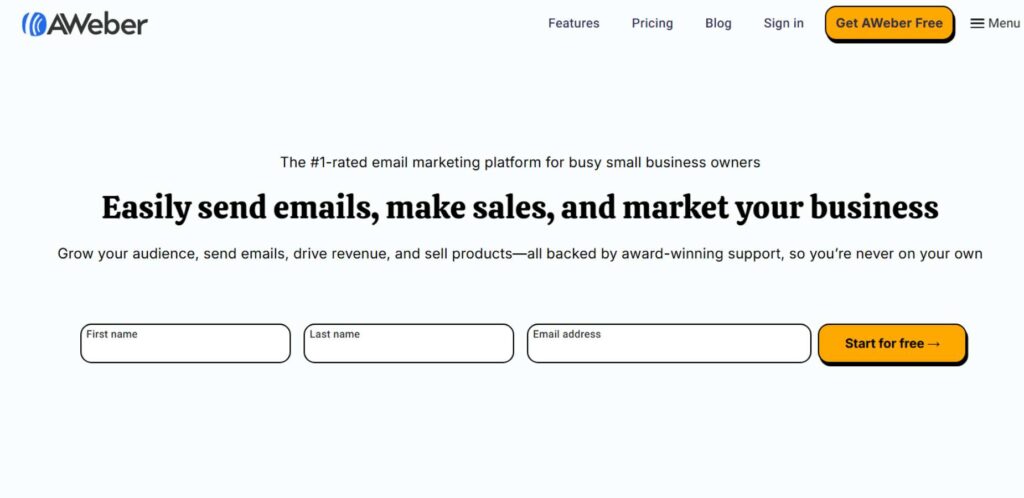
AWeber is a well-established email marketer that has features that mail automation, subscribers’ management, and analysis of results. It is one of the simplest email marketing platforms to use especially when it comes to designing email sequences for a business SS, and list management among others during any marketing process.
Automation tools of AWeber are the best for small businesses who are seeking an affordable solution to send automated and systematic e-mails and expand their mailing lists.
Features:
- Email automation sequences
- Subscriber segmentation
- A/B testing and performance tracking
- Drag-and-drop email editor
- Free plan available for up to 500 subscribers
Website: www.aweber.com
Rating: 4.5/5
Best For: Small businesses and solopreneurs looking for an affordable, easy-to-use email marketing platform.
10. Omnisend
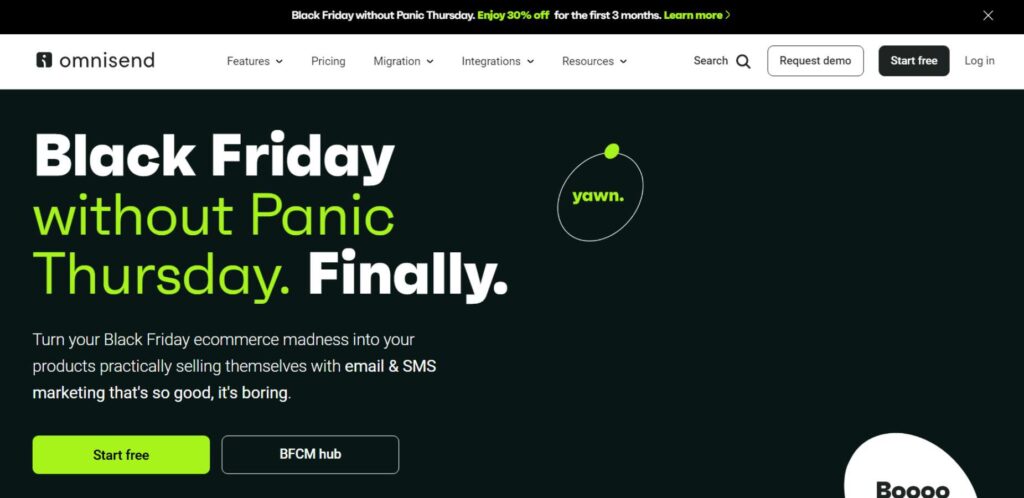
Omnisend is intended for those companies that have an online store and are willing to send e-mail, SMS or push notifications. Mainly targeting multi-channel marketing, you can be able to create powerful campaigns based on communication channels ensuring that clients are well engaged. Omnisend also has pre-built automation templates that perform marketing scenarios.
Omnisend’s advanced segmentation features let you create highly targeted emails that boost conversions and customer retention.
Features:
- Multi-channel automation (email, SMS, push notifications)
- Abandoned cart and product recommendation emails
- Advanced segmentation and targeting
- A/B testing and performance analytics
- Free plan available with up to 500 emails per month
Website: www.omnisend.com
Rating: 4.7/5
Best For: eCommerce businesses looking for a multi-channel marketing automation platform.
11. Moosend
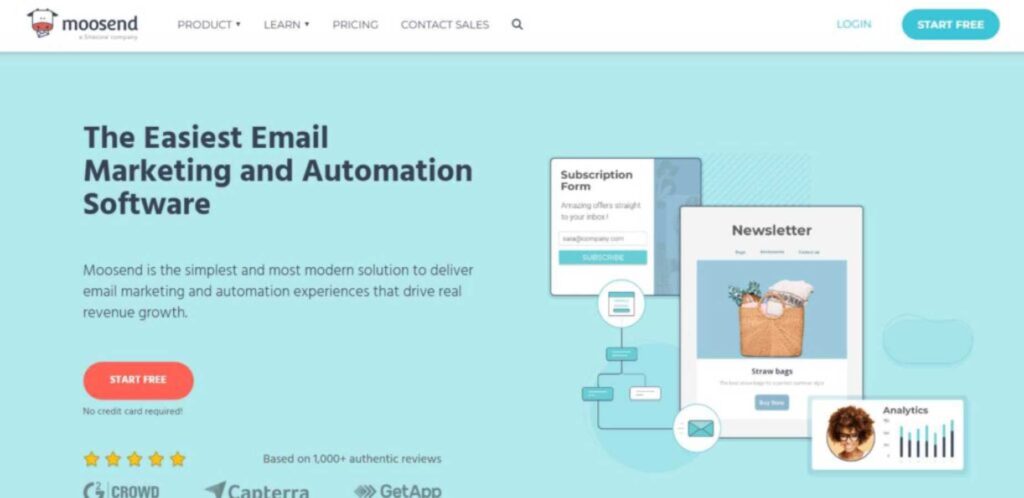
Moosend is an email marketing solution that works as CRM, providing powerful automation tools for affordable cost. As a small business email marketing solution, Moosend helps users to effectively create and schedule personalised email marketing campaigns without any special effort. Using an email interface integrated into it, organizations can easily configure the flow of emails, manage the audience and fine-tune the campaign results with the help of split testing.
Due to its good reporting features and flexibility, it is ideal for medium companies that will interact with customers with little capital investment.
Features:
- Drag-and-drop email builder
- Advanced automation workflows
- Segmentation and list management
- A/B testing and reporting
- Free plan available
Rating: 4.5/5
Best For: Small to medium-sized businesses looking for an affordable, easy-to-use email marketing platform.
12. Benchmark
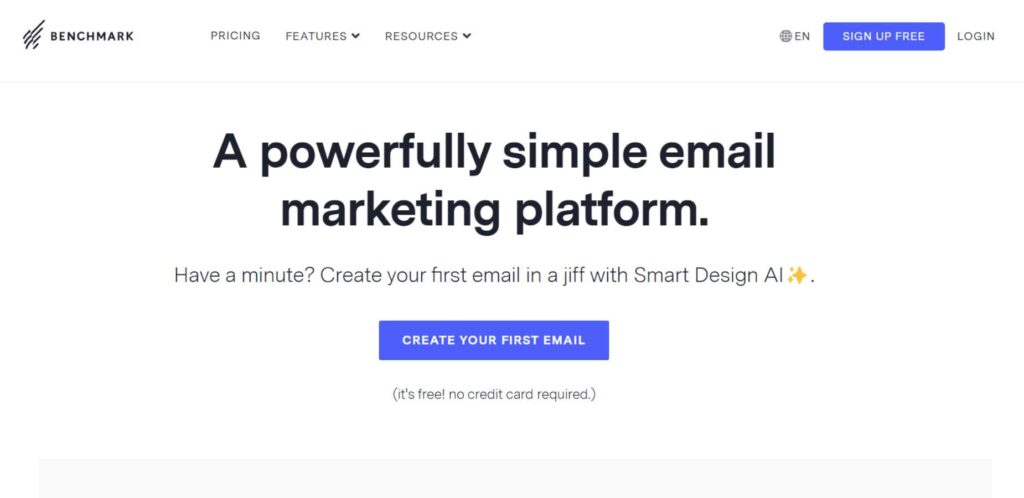
Benchmark Email is one of the best intuitive email marketing platforms which aims to assist companies to manage and plan their email marketing campaigns. Recently recognized for its ease of use, Benchmark Email enables marketers to create professional-looking emails and streamline campaigns and moves without coding skills. This makes it most suitable for small businesses, non-profits and new start-ups in need of a simple and efficient way of following up on the leads and customers.
Its key features include its drag-and-drop editor, A/B testing, as well as advanced reporting which ensure that business owners improve their campaign performance and increase ROI.
Features:
- Pre-designed email templates
- Automation workflows
- Segmentation
- A/B testing
- Reports and analytics
Website: https://www.benchmarkemail.com
Rating: 4/5
Best For: Small businesses and startups looking for an affordable and easy-to-use email automation solution.
13. MailerLite
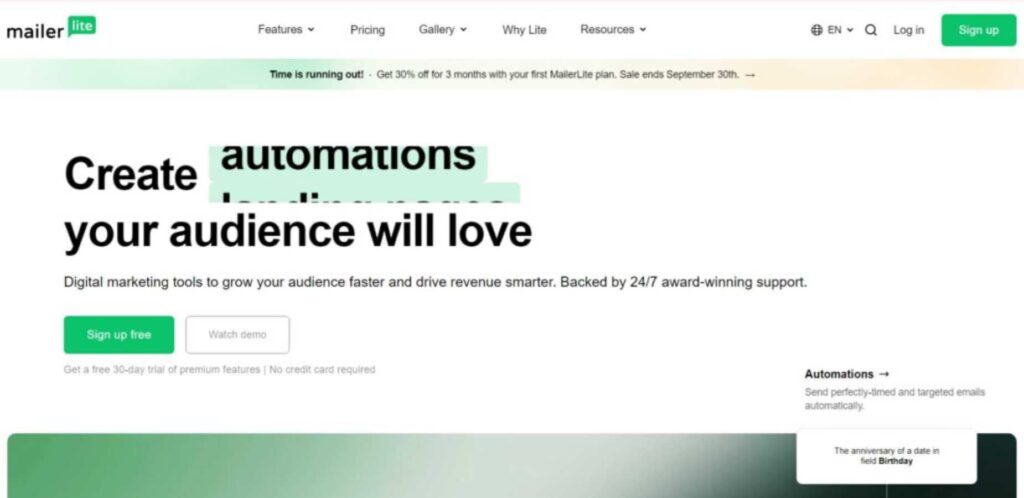
MailerLite is an uncomplicated yet affordable mass mailing system targeting small businesses, start-ups, and bloggers to create professional-looking mail. MailerLite also supports easy lead capture and audience nurturing and is highly focused on the automation of the whole process. The features include an easy-to-use drag-and-drop editor, quality segmentation and personalized landing pages making it a useful tool for the marketeer.
MailerLite also has a very useful free version perfect for businesses who are only starting to explore the idea of email marketing.
Features:
- Email automation
- Drag-and-drop editor
- Landing pages creation and forms
- Segmentation and targeting
- Free plan available
Website: https://www.mailerlite.com
Rating: 4.5/5
Best For: Small businesses, content creators, and startups looking for an affordable, user-friendly email marketing tool.
Email Automation Tools: Quick Comparison
| Tool | Best For | Key Features | Price Range |
| Mailchimp | Small businesses, startups | Pre-built workflows, A/B testing, advanced analytics | Free – $350/month |
| ActiveCampaign | Mid-sized businesses, CRM users | Custom workflows, segmentation, CRM integration | $9 – $229/month |
| HubSpot | Enterprises, inbound marketers | Advanced automation, smart content, integration with CRM | Free – $3,200/month |
| GetResponse | Marketers, eCommerce businesses | Landing pages, webinars, multi-step workflows | $19 – $119/month |
| ConvertKit | Content creators, bloggers | Tagging system, visual automation builder, subscriber management | $9 – $25/month |
| Sendinblue | Small businesses, multi-channel | SMS, email, chat automation, advanced segmentation | Free – $66/month |
| Klaviyo | E-commerce businesses | Product recommendations, segmentation, dynamic content | $20 – $1,000/month |
| Drip | E-commerce, SaaS | Behavioural triggers, CRM, workflow builder | $19 – $1,599/month |
| AWeber | Small businesses | Email templates, autoresponders, drag-and-drop editor | Free – $29/month |
| Omnisend | E-commerce, multi-channel | Multi-channel workflows, A/B testing, advanced reporting | $16 – $199/month |
| Moosend | SMBs on a budget | Budget-friendly, drag-and-drop editor, advanced reporting | Free – $400/month |
| Benchmark | SMBs, startups | Easy-to-use, email templates, automation workflow | Free – $13/month |
| MailerLite | Small businesses, startups | Simple interface, automation workflows, landing pages | Free – $50/month |
How to Choose the Right Email Automation Tools for Your Business
When selecting an email automation tool, it’s essential to evaluate several factors to find the best fit for your needs:
Business Size and Needs
Some tools are designed to fit SMBs or startups, and they are easier to use and cheaper compared to their counterparts. Larger businesses or enterprises, however, may need features such as integration with their existing Customer Relations Management system, complicated workflow, or the ability to use multiple channels to market the application. Think about what characteristics would assist you in addressing your goals.
Features and Capabilities
Like any other email automation tool, each one comes with its features. If your goal is to increase your email list, you’ll need good segmentation tools. If you want to personalize your offering, target the platforms that have an approach with dynamic content or use AI for automation. Check if the tool satisfies the requirements which are necessary to implement your chosen marketing plan.
Pricing
Price is also another consideration if the business is operating under the issue of cash and resource constraints. Most of the homographic platforms provide a free version or trial but you should determine whether the provided features would sufficiently meet your firm’s requirements in future. Compare products and service plans and select the best and most affordable service plan for your organization.
Ease of Use
Whereas automation is all about convenience, it should not be at the cost of convenience. Some of the features to consider include; User-friendly tools, drag-and-drop email campaign editors and customer support. If you want to get into a programming language or software or want to start working on a project, you should be able to do so with little prior training.
Integrations
Email automation is also not an isolated process. Your email marketing software should also integrate with other tools that include your CRM software, social media accounts, eCommerce platforms, and others. Make sure that the tool you select works well with the other tools you have in place.
Conclusion
When it comes to selecting the correct email automation tools this is greatly influenced by the size and nature of your business, your marketing needs, and last but not least the amount of money you are willing to spend. From basic email marketing for simple automation up to an advanced platform where you can handle multiple marketing channels, there is always an option for you. With the right platform, business owners and managers can effectively coordinate their related communication efforts, customers can be better engaged and satisfied, and the realization of high RoI will be consequently achieved.
Spend some time discussing these 13 tools, consider the pros and cons of each, and choose the tool that will be most suitable for you. Happy emailing!
Frequently Asked Questions (FAQs)
What is email automation?
Electronic mailing is the act of delivering prompted or event-initiated e-mails to other clients. These may comprise tips, notifications such as welcome emails, abandonment of cart reminders as well as follow-up emails posted after purchase depending on the buyer’s actions.
In what ways will my business benefit from email automation?
Email automation makes the work easier and faster, increases customers’ interaction, can be used to target different clients equally with a single message, and makes business profitable. It makes it possible to deliver the right message at the right time, and without having to input human effort on the purchase which will result in boosting conversion rate as well as customer satisfaction.
What kind of emails can be delivered to people automatically?
With this tool, you can send out welcome emails, invitations to purchase something again left in a cart, transactional emails, leads nurturing, reactivation campaigns, etc. Such automation ensures that your audience is always engaged and leads them through different stages of the funnel.
What should one consider when selecting the right email automation tools for their business?
You should search for those that apply to your business size, have the wanted features like segmentation or specific workflows, compatible with other software you work with, and are affordable. Various platforms such as Mailchimp, ActiveCampaign and Sendinblue are available to meet people’s demands.
How can I make use of the automation of emails to increase my sales?
Yes! Measurable messages include abandoned cart messaging, after-purchase follow-ups, and personalized product suggestions that can increase customer conversion rates, replay purchases, and improve loyalty and revenue.
